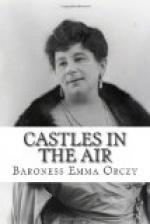All things considered, then, when M. Charles Saurez suddenly said, “Well?” with marked impatience, I replied, “Agreed,” and within five minutes I had two hundred francs in my pocket, with the prospect of two hundred more during the next four and twenty hours. I was to have a free hand in conducting my own share of the business, and M. Charles Saurez was to call for the document at my lodgings at Passy on the following morning at nine o’clock.
2.
I flatter myself that I conducted the business with remarkable skill. At precisely ten minutes to eleven I rang at the Chancellerie of the Ministry for Foreign Affairs. I was dressed as a respectable commissionnaire, and I carried a letter and a small parcel addressed to M. de Marsan. “First floor,” said the concierge curtly, as soon as he had glanced at the superscription on the letter. “Door faces top of the service stairs.”
I mounted and took my stand some ten steps below the landing, keeping the door of M. de Marsan’s room well in sight. Just as the bells of Notre Dame boomed the hour I heard what sounded like a furious altercation somewhere in the corridor just above me. There was much shouting, then one or two cries of “Murder!” followed by others of “What is it?” and “What in the name of ----- is all this infernal row about?” Doors were opened and banged, there was a general running and rushing along that corridor, and the next minute the door in front of me was opened also, and a young man came out, pen in hand, and shouting just like everybody else:
“What the ------ is all this infernal row about?”
“Murder, help!” came from the distant end of the corridor, and M. de Marsan—undoubtedly it was he—did what any other young man under the like circumstances would have done: he ran to see what was happening and to lend a hand in it, if need be. I saw his slim figure disappearing down the corridor at the very moment that I slipped into his room. One glance upon the desk sufficed: there lay the large official-looking document, with the royal signature affixed thereto, and close beside it the copy which M. de Marsan had only half finished—the ink on it was still wet. Hesitation, Sir, would have been fatal. I did not hesitate; not one instant. Three seconds had scarcely elapsed before I picked up the document, together with M. de Marsan’s half-finished copy of the same, and a few loose sheets of Chancellerie paper which I thought might be useful. Then I slipped the lot inside my blouse. The bogus letter and parcel I left behind me, and within two minutes of my entry into the room I was descending the service staircase quite unconcernedly, and had gone past the concierge’s lodge without being challenged. How thankful I was to breathe once more the pure air of heaven. I had spent an exceedingly agitated five minutes, and even now my anxiety was not altogether at rest. I dared not walk too fast lest I attracted attention, and yet I wanted to put the river, the Pont Neuf, and a half dozen streets between me and the Chancellerie of the Ministry of Foreign Affairs. No one who has not gone through such an exciting adventure as I have just recorded can conceive what were my feelings of relief and of satisfaction when I at last found myself quietly mounting the stairs which led to my office on the top floor of No. 96 Rue Daunou.




